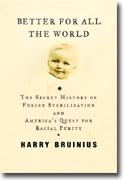Better for All the World
Harry Bruinius
book reviews:
· general fiction
· chick lit/romance
· sci-fi/fantasy
· graphic novels
· nonfiction
· audio books
· author interviews
· children's books @
curledupkids.com
· DVD reviews @
curledupdvd.com
newsletter
win books
buy online
links
home
for authors
& publishers
for reviewers

 |
Better for All the World: The Secret History of Forced Sterilization and America's Quest for Racial Purity Harry Bruinius Knopf Hardcover 416 pages February 2006 |
|
In 1927, Justice Oliver Wendell Holmes wrote “the most resounding legal affirmation” of the “science” of eugenics and its new offshoot, genetic engineering: “It is better for all the world if instead of waiting to execute degenerate offspring for crime, or to let them starve for their imbecility, society can prevent those who are manifestly unfit from continuing their kind…three generations of imbeciles are enough.”
Better for All the World traces the beginnings of the effort to treat “humanely” those whom society chose to label as unfit, whether epileptic, moronic, or perhaps just alcoholic. “Moron” was a scientific designation for a person whose intelligence level, measured by standard tests, did not rise above that of an eight-year-old. Morons were thought to be a plague upon the otherwise healthy social body of America. Alcoholics were clearly a drain on public resources. Jews were widely regarded as “lascivious and greedy,” two qualities that apparently did not infect the purer ethnicities. Frankly, it would be better, most eugenicists agreed, if America were populated with Nordic and Aryan genotypes. Sound familiar? There was time in the mid-twentieth century when eugenics was at its zenith, when county fairs featured booths offering prizes to the “fitter family,” and simple language explained that “some people are born to be a burden on the rest,” “very few normal persons ever go to jail” and “every second, crime costs America $100,000.” And finally, “If all marriages were eugenic we could breed out most of this unfitness in three generations.” The proponents of these theories also did much meritorious research. In locating and ultimately sterilizing thousands of the feebleminded and the chronically poor, they also shed light on the principles of heredity of certain traits (such as alcoholism and Huntington’s chorea). Though the major figures in the movement – Francis Galton, Charles Davenport, and Harry Laughlin – were strong, high-minded men, many of the pioneers of the fieldwork were women. They believed, as women do, that all babies should be beautiful and all husbands loyal and loving. If they could help to bring that ideal into being by getting rid of those who did not measure up to the mark, they were glad to do so. Nonetheless, their legacy is shameful. Most of what they proposed and put into practice has gone the way of the Jim Crow laws and other similar racially and socially based biases that are no longer acceptable in our country. This book uncovers in case histories some of the individual damage caused by the eugenic policies, such as the sad tale of Lucille, sterilized in Colorado when she was 17. Lucille refuses to be photographed and declares “I ain’t nobody worth carin’ about.” She never accepted any romantic advances from men after her operation, believing herself to be unworthy since she could not produce children. Lucille says, “They took my heart and left a stone,” characterizing her involuntary sterilization as “sexual murder.” The author of Better for All the World, Harry Bruinius, is student both of theology and journalism, and therefore well-qualified to unfold this extraordinary story with its perplexing moral questions. “Will genetic enhancement enhance human peace and repose?” he asks, or will it allow the powerful “haves” once again to engineer the have-nots out of the life game? Think about it. Originally published on Curled Up With A Good Book at www.curledup.com. © Barbara Bamberger Scott, 2006 |
|
|
|
 Click here to learn more about this month's sponsor! |
|
| fiction · sf/f · comic books · nonfiction · audio newsletter · free book contest · buy books online review index · links · · authors & publishers reviewers |
|
| site by ELBO Computing Resources, Inc. | |
 This justification for the sterilization of the unwanted, nearly always poor and often insane or disabled (though in some cases rather average but untouched by the mercy of the law) was later to be cited by the Nazis at Nuremburg to defend the actions of the Third Reich.
This justification for the sterilization of the unwanted, nearly always poor and often insane or disabled (though in some cases rather average but untouched by the mercy of the law) was later to be cited by the Nazis at Nuremburg to defend the actions of the Third Reich.